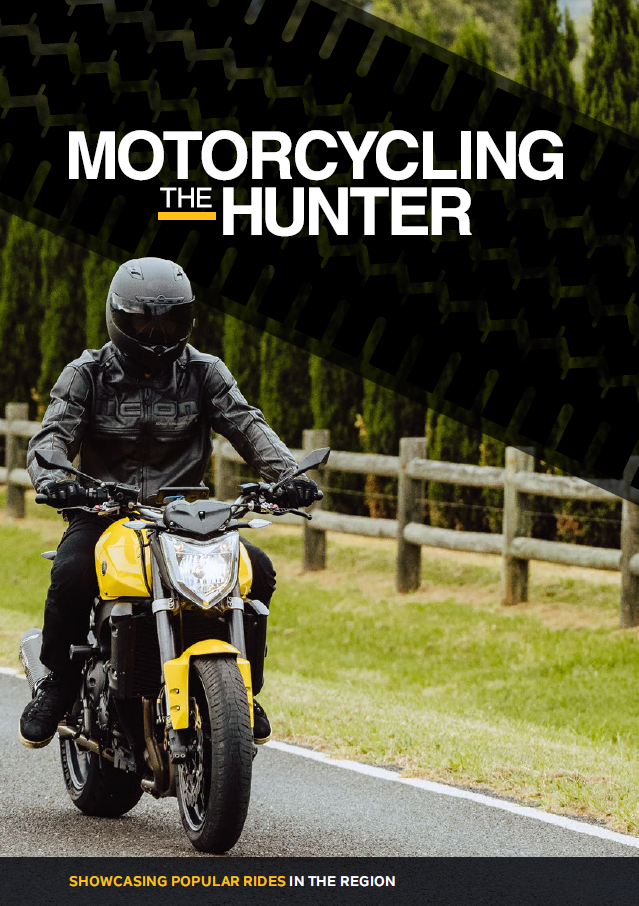Road safety
Road safety is everybody's responsibility. We work closely with Transport for NSW and NSW Police to deliver local road safety behavioural programs to improve safety on our roads.
We can all contribute to the safety of our community by using low-risk driving techniques; keeping an eye out for pedestrians, cyclists and motorcyclists; and obeying the road rules. For State road safety campaigns that we are involved in, head to Transport for NSW’s Centre for Road Safety.
Click on the following local road safety initiatives to find out more:
Building on the popular caravan towing workshops held across 2023 and 2024, Council was able to secure funding from Transport for NSW to hold a third round of informative sessions. These were held in Raymond Terrace in November 2024.
It is the driver/owner’s responsibility when it comes to ensuring a vehicle and caravan combination is legally compliant. The way you load your caravan can also impact stability when driving. Know the rules and have your set up weighed to safeguard your family and others on the road.
Some aspects you should look into include: weight limits for your car and caravan, tow ball weight, combined mass, mirror usage, signage and number plate placement, brake controllers and speed limits for towing. All these things impact safety and your insurance.
When towing, you should also consider: your positioning within the lane, doing routine maintenance checks and making sure to create a safe work zone for yourself in the event of a flat tyre or breakdown. As a caravan, you are not permitted to park in a truck rest area as these are designated for truck use only.
Here are some helpful links to find out more:
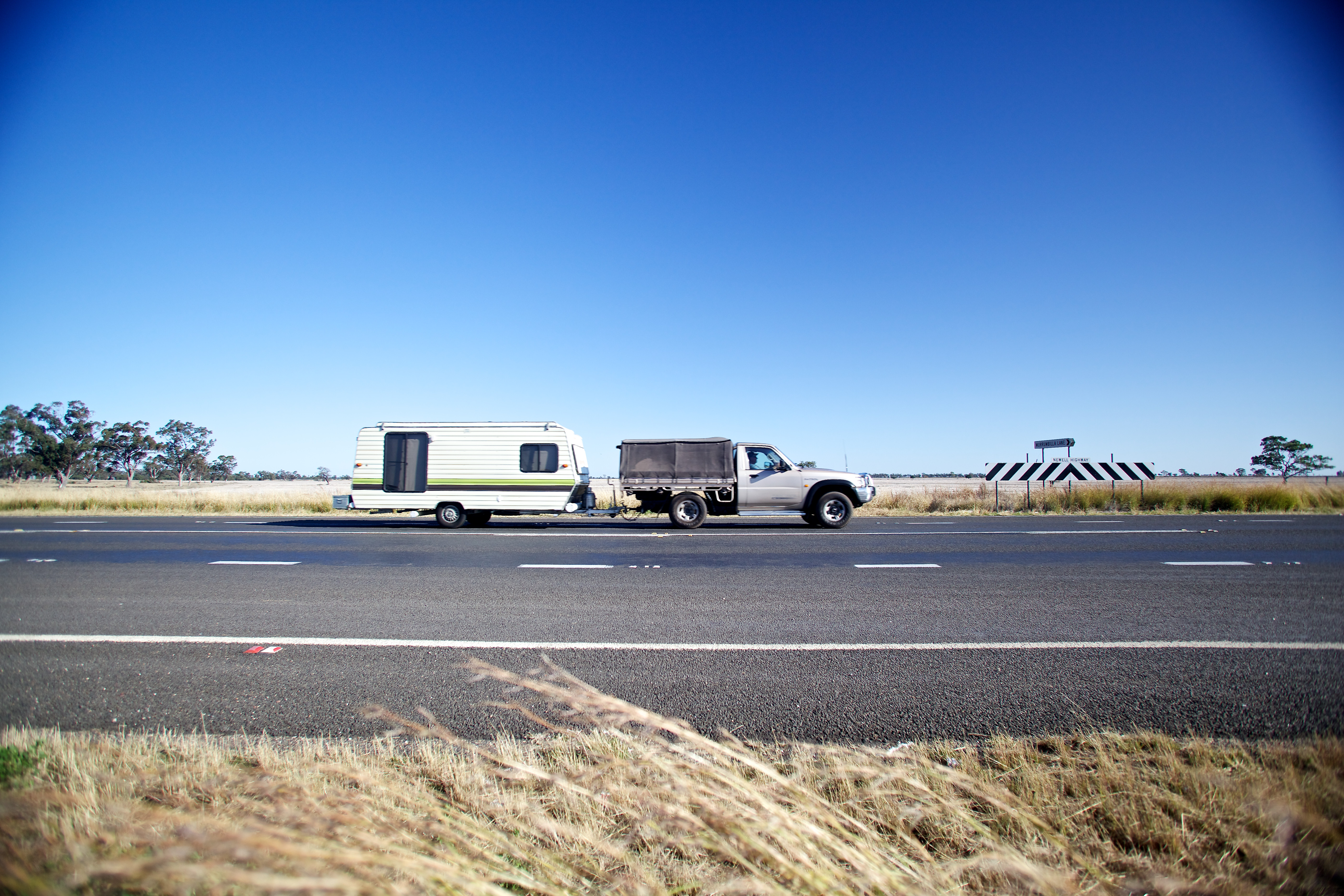
© Copyright State of New South Wales (Transport for NSW)
If you’re drinking – don’t drive. Always have a Plan B.
Choose safe transport options to get home safely. There are various courtesy buses operating across our region by members of the Port Stephens Liquor Accord.
Head to CourtesyBus.com.au to find venues in Port Stephens that offer a courtesy bus, their times of operation, locations of pick up/drop off and contact details for you to book your seat.
Council also partners with the Port Stephens Liquor Accord to use ‘Plan B’ messaging and encourage drivers to make safe choices when getting home after drinking. Follow Terry Godmother’s advice.
You don’t have to be drunk to be affected by alcohol. The effects of alcohol are wide ranging and impossible to avoid. These include:
- Slowed brain function
- Reduced ability to make decisions or react quickly
- Elevated confidence, leading to greater risk taking
- Reduced balance and coordination
- Increased drowsiness, making it easier to fall asleep at the wheel.
Taking illegal drugs before driving puts you at greater risk of a crash. Transport for NSW’s Centre for Road Safety crash data shows that the presence of illegal drugs is involved in around the same number of fatal crashes as illegal levels of alcohol. Learn more about the effects and the penalties of drug driving here.
Council partners with the Little Blue Dinosaur Foundation to promote pedestrian safety along the Nelson Bay foreshore during the busy Christmas holiday period. Colourful signage pops up as a reminder to drivers to slow down in recognition of the increased foot traffic in the region. The campaign also urges families to be extra vigilant when supervising children near the roadside and to hold hands when crossing the road.
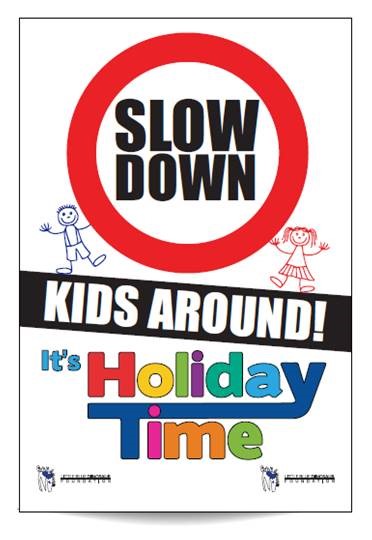
Port Stephens Library has a copy of Little Blue Dinosaur Foundation Founder Michelle McLaughlin’s story “Tom’s Holiday”. It provides talking point for families and contains safety tips and reminders for parents and children about why it’s important to hold hands by the roadside.
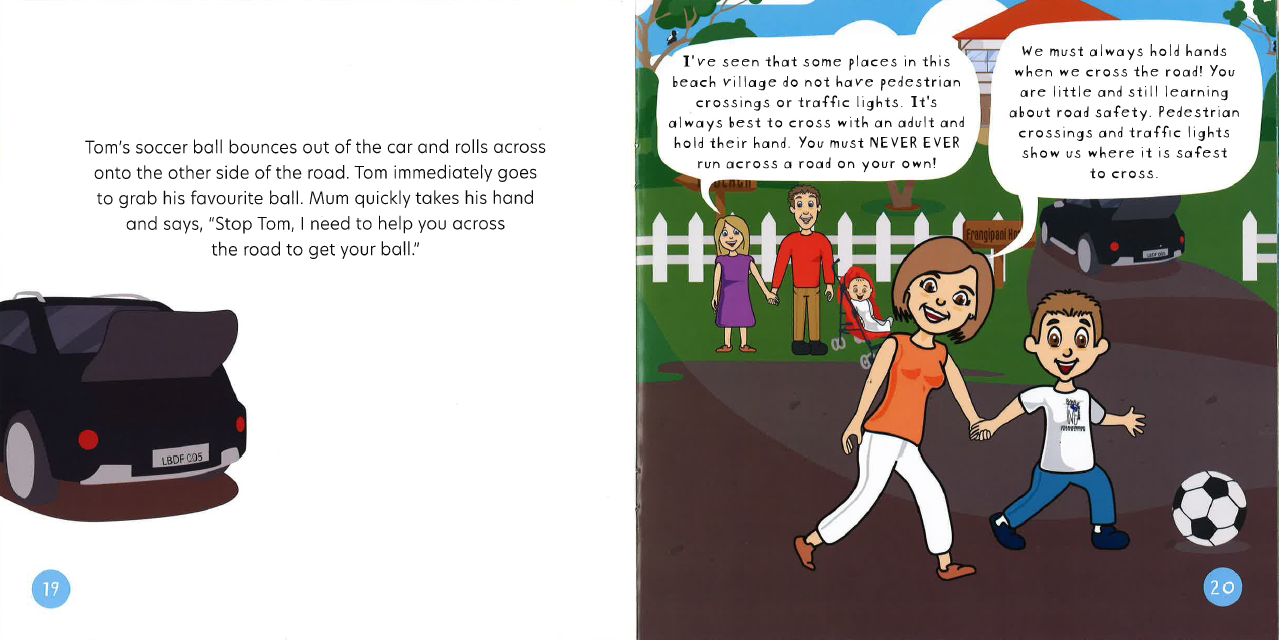
Tips for Shared Pathways
Care should be taken in areas of high pedestrian activity due to the variety of users on shared pathways.
Here are some tips for path users:
- Cyclists and mobility scooters should slow down to walking speed and warn pedestrians of their approach by ringing a bell or calling out 'coming through'.
- Keep to the left on the path, this allows others to safely pass you if they wish.
- If you wish to stop, move off the path to the left so you don't obstruct other path users.
- If you are walking with your dog, please keep it on a short lead when passing by others.
- Make eye contact with a driver before stepping off the kerb. Don’t assume a driver has seen you.
- Use pedestrian crossings wherever possible.
- Children under the age of 10 years should be well supervised by an adult even on quiet back streets and should be taught to keep to the left.
- By law, all cyclists, regardless of age, must wear an Australian standards approved bicycle helmet whenever they ride.
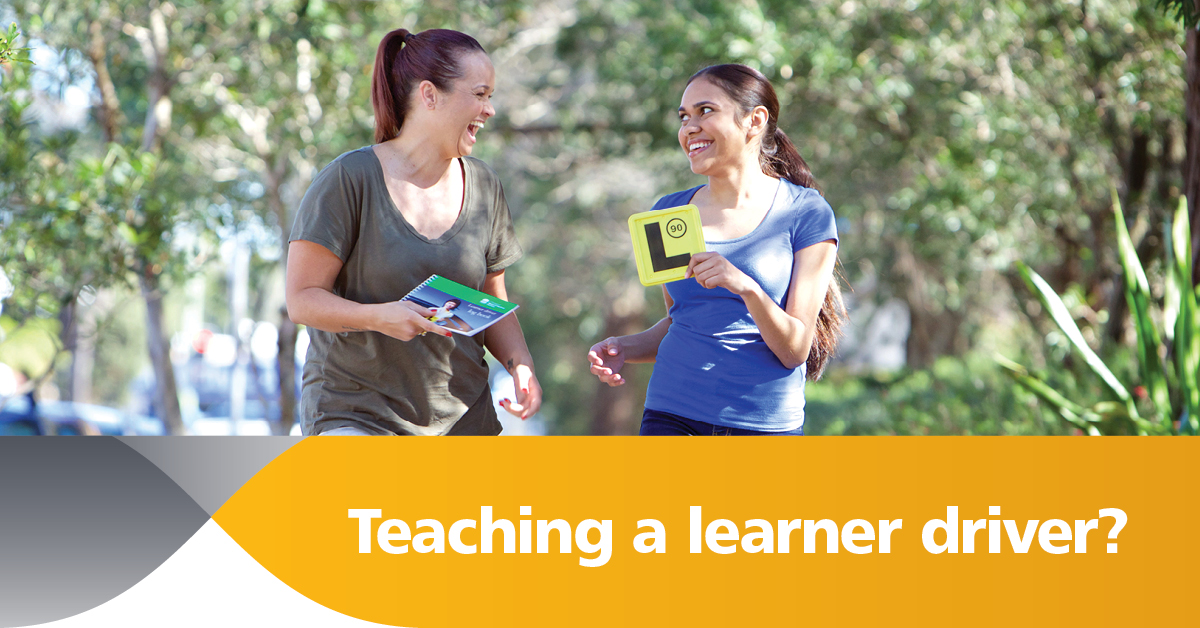
As young people approach driving age, it is important for their parent/guardian to be aware of the requirements of the 120 hours of supervised driving. P-plate drivers are involved in more crashes than any other driving group (including learner drivers). Parents and supervisors play a key role in guiding and promoting safe driving habits.
Transport for NSW have developed a series of modules aimed to assist parents/guardians in their important role as supervisor of a Learner driver. The five modules are self paced and will help you:
- increase your confidence as a supervisor
- plan varied on-road experiences and set goals with your learner driver
- demonstrate and encourage safe habits and behaviours
- make the most of each supervised session as opportunities to teach hazard perception skills
- understand the licence conditions for learner and provisional licence holders
The online modules cover similar content to the ‘Helping Learner Drivers Become Safer Drivers’ face-to-face workshop facilitated by Council’s Road Safety Officer.
You can access the modules at any time at:
https://www.transport.nsw.gov.au/roadsafety/young-drivers/supervising-learner-drivers
Council has run two free Motorcycle Safety Workshops over 2024-25 to assist motorcyclists across the Hunter to manage their on-road risks.
Survive the Ride Association of NSW was invited to facilitate the workshops, which focused on:
- adjusting riding habits to reduce personal risk
- identifying and finding solutions for common and personal challenges
- riding posture for different bike types
- speed management to allow appropriate response to hazards and potential problems
- selecting the safest gear for your ride
Motorcycling the Hunter
The Hunter Region is home to some of the most popular motorcycling routes in the State. Motorcycling the Hunter is a joint project between neighbouring Councils in the region and aims to lessen motorcycle crashes on recreational routes.
The “Motorcycling the Hunter” booklet has been developed to showcase some of the Hunter’s best motorcycling routes and increase safety knowledge for riders.
Download the latest interactive Motorcycling the Hunter booklet (PDF 12.6MB).
Safety Tips
How do you take a safe corner? Watch this video demonstration:
Information Links
Some helpful motorcycling related websites:
- Transport for NSW Centre for Road Safety
- MotoCAP (Motorcycle Clothing Assessment Program): Find and buy the best safety gear you can, taking into consideration the safety ratings for the kinds of roads you will ride on.
- Ride to Live
- Motorcycle Riders Handbook
Please choose safety over convenience when it comes to movement in school zones. School zones contain enforceable time-bounded traffic and parking rules to increase pedestrian safety for school children during key drop off and pick up times.
You will find the following regulatory signs around schools. Please familiarise yourself with what each sign means and actively look for them at your child’s school.
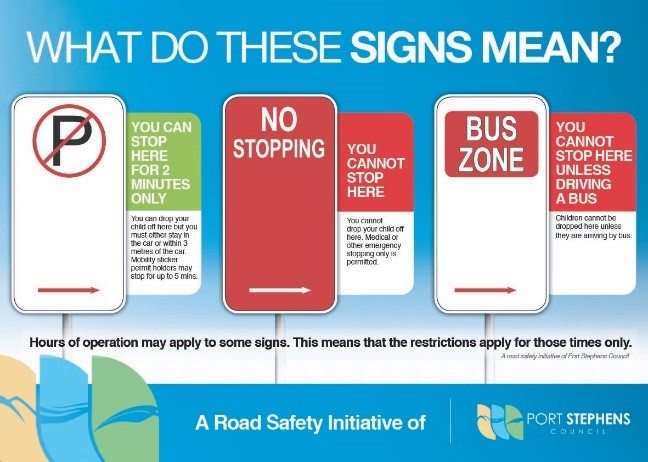
Schools, parents and guardians can download the following information flyer about school zones:
- School zone parking rules and tips (PDF 1 MB)
The NSW Centre for Road Safety contains further information about safety around school zones.
Driving too fast is the biggest contributor to death and injury on NSW roads. In Port Stephens, 1 in 5 crashes involve speeding. Council supports the enforcement of speed limits in Port Stephens to reduce the likelihood of crashes and improve crash outcomes.
The faster you go, the longer it takes to stop.
© State of New South Wales (Transport for NSW) [2022]
Speed also impacts the chance of survival in a crash:
(Based on Wramborg, P 2005, ‘A new approach to a safe and sustainable road structure and street design for urban areas’, Road safety on four continents conference, 2005, Warsaw, Poland, Swedish National Road and Transport Research Institute (VTI), Linkoeping, Sweden.)
With funding from Transport for NSW’s Local Government Road Safety Program, Council uses speed displays to remind drivers of their responsibility to adhere to set speed limits. They are located in carefully selected locations and moved on a rotational basis.
Council works in partnership with Port Stephens-Hunter Police Command to support state-wide enforcement operations and to provide data for targeted enforcement on local streets.
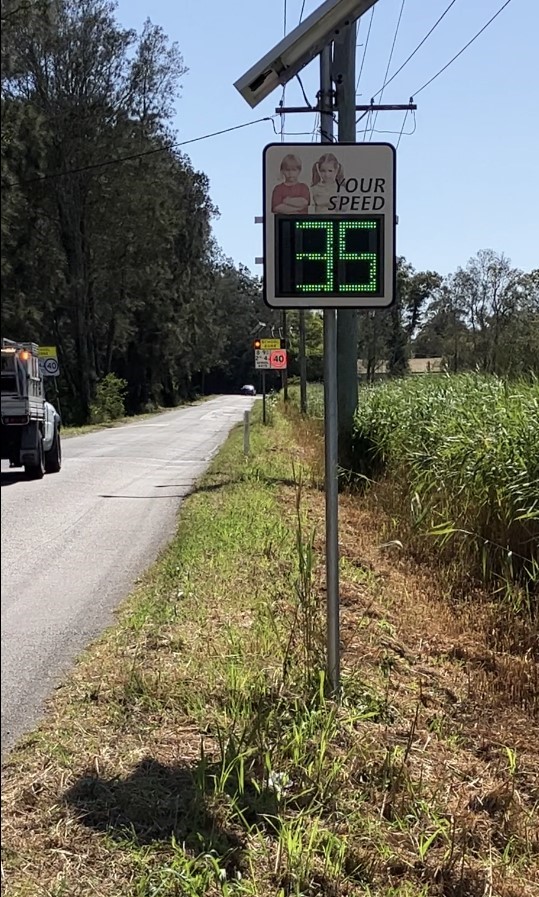
Speed limits
Speed limits are set by Transport for NSW. Remember, 50km/hr is the default speed limit in all built up areas in NSW without a speed sign. If you don’t know the limit, slow down to 50.
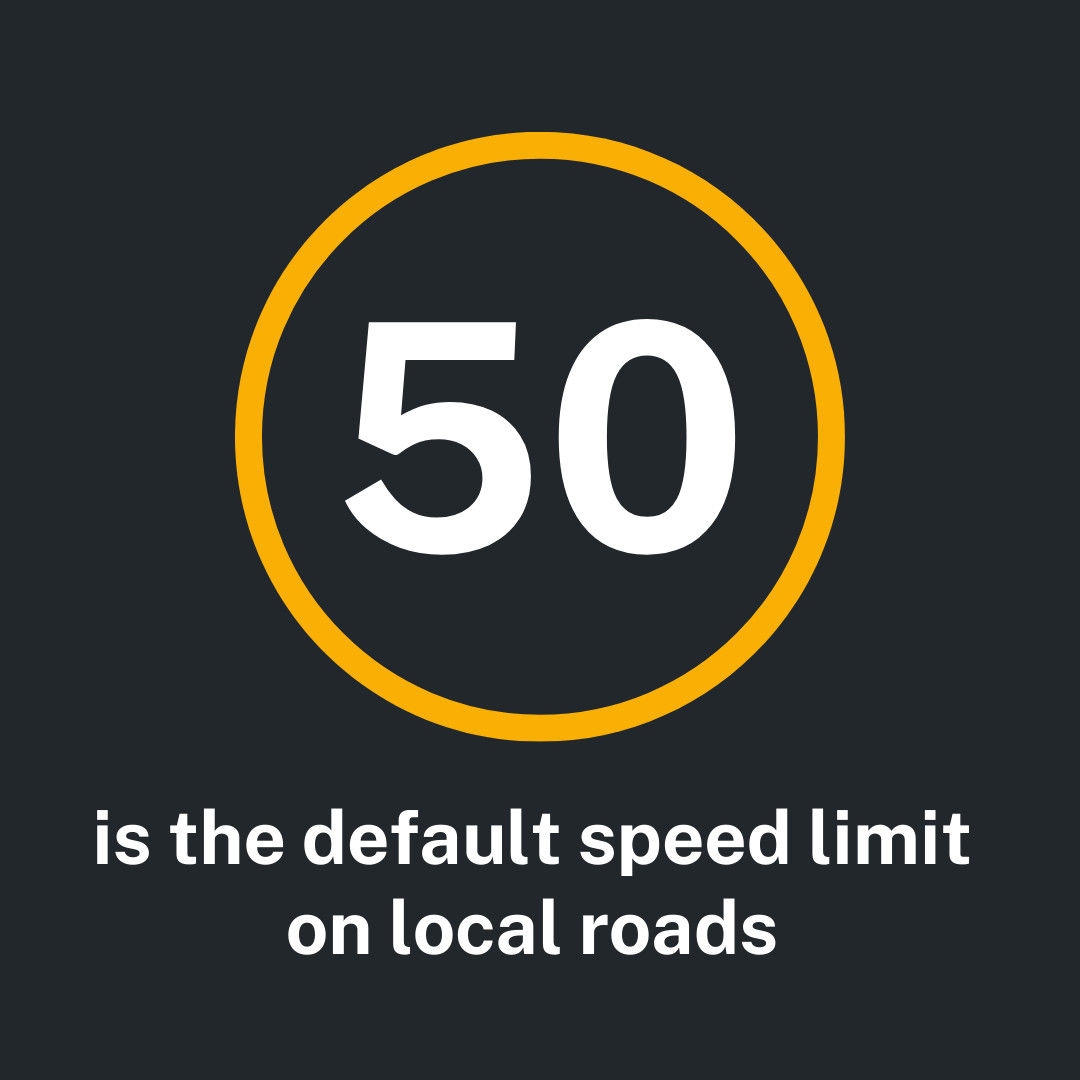
You may submit a request to Transport for NSW for a speed limit review here.
The Centre for Road Safety website contains information about the Speed Adviser app, the locations of speed cameras and how to nominate a location for a speed camera. See more here.
Reporting speeding or dangerous driving
NSW Police are the responsible agency for driving violations on our roads. Police rely on information from the public to make our streets safer. You are encouraged to report instances of unsafe or reckless driving and breaches of law, including speeding and hooning behaviour, by calling the Police Assistance Line on 131 444.
Would you like a guest speaker? The Road Safety Officer is available to deliver a road safety presentation to older road users called “The Road Ahead”.
This presentation is aimed at Port Stephens residents approximately 65+ years of age and covers topics such as:
- driver licensing
- mobility, health and remaining independent
- safer driving habits
- motorised scooters
- commonly misunderstood road rules
The presentation takes approximately 1.5 hrs, including a break. Please make contact with the Road Safety Officer on 4988 0527 to make an enquiry.


